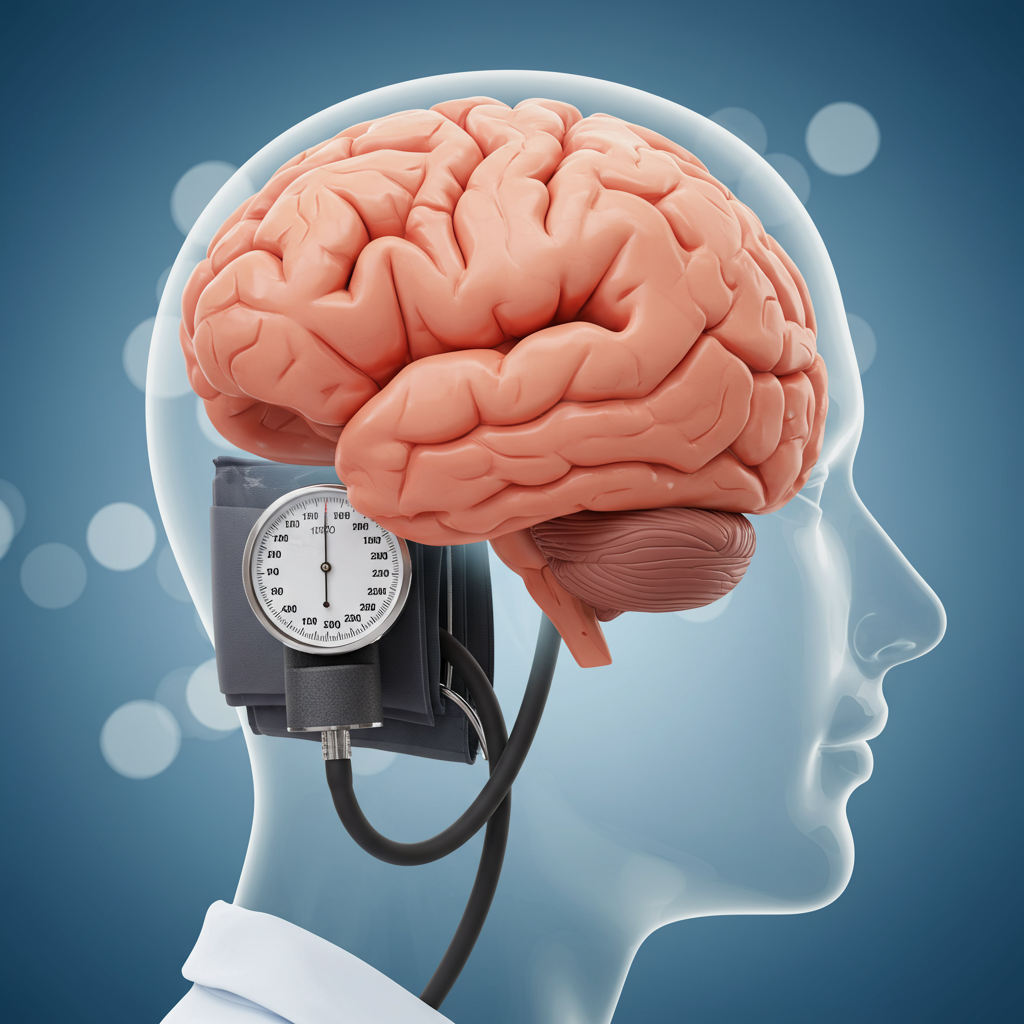Emerging medical guidelines offer a transformative insight into safeguarding your cognitive future: rigorously managing blood pressure can significantly reduce the risk of dementia. This groundbreaking consensus from leading medical organizations, including the American Heart Association (AHA) and the American College of Cardiology (ACC), highlights a powerful connection between cardiovascular well-being and brain health. For millions worldwide, this affirmation brings renewed hope, emphasizing that proactive steps today can shield the mind for years to come.
The Definitive Link: How Blood Pressure Impacts Brain Health
The relationship between high blood pressure, or hypertension, and cognitive decline has long been suspected. However, new, robust evidence solidifies this crucial link. High blood pressure is now definitively recognized as a primary risk factor not only for heart attack, stroke, and kidney disease but also for various forms of dementia. It damages the tiny, delicate blood vessels in the brain, which are vital for delivering oxygen and nutrients, ultimately impairing memory, processing speed, and overall cognitive function.
Landmark Research Confirms the Connection
A pivotal study conducted in rural China provided the conclusive evidence needed to shape these updated guidelines. This large, cluster-randomized controlled trial persuasively demonstrated that intensive blood pressure control, specifically maintaining levels below 130/80 mm Hg, lowered dementia risk by an impressive 15%. Furthermore, it reduced the risk of cognitive impairment by 16%. According to Dan Jones, chair of the guideline writing committee, this research was the first to definitively show that meticulously lowering systolic blood pressure to below 120 mm Hg can indeed decrease the likelihood of developing dementia. This certainty offers “such good news for people around the world,” he noted.
The “New Normal” for Blood Pressure Goals
The new guidelines reaffirm 120/80 mm Hg as the optimal blood pressure target for all U.S. adults, a standard first endorsed by professional organizations in 2017. While this ideal remains the benchmark, the guidelines encourage initiating management to bring the top number below 130 mm Hg for individuals already diagnosed with high blood pressure—the threshold for Stage 1 hypertension. This pragmatic approach aims to achieve better control for the nearly half of U.S. adults who currently exceed 130/80 mm Hg.
New Guidelines: A Holistic Approach to Hypertension Management
The 2025 high blood pressure guidelines, published in peer-reviewed journals like Circulation and JACC, represent a comprehensive update designed to provide clinicians with more tailored strategies for managing blood pressure across the lifespan. Developed in collaboration with 11 other healthcare organizations, they emphasize prevention, earlier intervention, and personalized care.
Key Shifts in Treatment Philosophy
A significant shift in the new recommendations is the call for earlier and more aggressive treatment when lifestyle changes aren’t enough. Doctors are now advised to begin pharmacological treatment within three to six months if lifestyle modifications fail to improve blood pressure readings. For many patients, particularly those with Stage 2 hypertension (140/90 mm Hg or higher), starting with two blood pressure medications, ideally combined in a single pill, is recommended. This proactive stance aims to reduce long-term cardiovascular and neurological damage.
Precision Risk Assessment with PREVENT™
A cornerstone of the new guidelines is the recommendation to utilize the AHA’s PREVENT™ (Predicting Risk of Cardiovascular Disease Events) risk calculator. Released in 2023, this tool offers a more precise estimation of an individual’s 10- and 30-year risk for heart attack, stroke, or heart failure. What makes PREVENT™ unique is its reliance on a larger, more diverse database and its incorporation of variables like age, sex, blood pressure, cholesterol, and even zip code—serving as a proxy for social determinants of health. This holistic assessment enables more personalized treatment decisions and is also influencing upcoming 2026 cholesterol guidelines.
The Crucial Role of Lifestyle Modifications
Despite advancements in medication, healthy lifestyle behaviors remain the first line of defense against high blood pressure and are crucial for supporting overall cognitive function. The guidelines strongly reaffirm:
Sodium Restriction: Aim for less than 2,300 mg/day, ideally moving towards 1,500 mg/day. This helps the body regulate fluid balance and ease tension in blood vessel walls.
Potassium Enrichment: Incorporate potassium-rich foods like fruits, vegetables, and legumes, or consider potassium-enriched salt substitutes. Potassium helps flush out sodium and relaxes blood vessels.
Heart-Healthy Diet: Adhere to patterns like the DASH (Dietary Approaches to Stop Hypertension) plan, rich in whole grains, fruits, vegetables, lean proteins, and low-fat dairy. The Mediterranean and MIND diets are also highly recommended for their brain-protective benefits.
Regular Physical Activity: Engage in at least 75-150 minutes weekly of moderate-intensity aerobic and/or resistance training.
Weight Management: A modest 5% reduction in body weight for overweight or obese adults can significantly impact blood pressure.
Alcohol Moderation: Limit intake to no more than two drinks daily for men and one for women.
Stress Management: Techniques like yoga, meditation, or controlled breathing can help lower stress, which can impact blood pressure.
Home Blood Pressure Monitoring: Regularly checking blood pressure at home helps confirm diagnoses, track progress, and facilitate personalized care.
When Medication Becomes Essential
While lifestyle changes are foundational, many patients will still require medication to achieve their target blood pressure. Initial pharmacological treatments often include ACE inhibitors, ARBs (angiotensin receptor blockers), long-acting dihydropyridine calcium channel blockers, and thiazide-type diuretics. For individuals with Type 2 diabetes, obesity, or kidney disease, a multi-medication approach may be necessary to reach the desired below 130/80 mm Hg goal. Timothy Anderson, a primary care physician, notes that the new advice mostly urges doctors to better achieve existing goals, rather than demanding new actions from patients.
Special Considerations: Pregnancy, Obesity, and Lab Testing
The updated guidelines extend their focus to several key areas, ensuring comprehensive care across diverse patient populations.
Safeguarding Maternal and Fetal Health
The guidelines place increased emphasis on managing blood pressure before, during, and after pregnancy. Elevated blood pressure during pregnancy is a significant danger, linked to severe complications like preeclampsia, eclampsia, stroke, kidney problems, and premature delivery. For pregnant women with chronic hypertension, treatment with certain medications is recommended when systolic blood pressure reaches 140 mm Hg or higher or diastolic reaches 90 mm Hg or higher. Low-dose aspirin (81 mg/day) may also be considered to reduce preeclampsia risk. Continuous postpartum monitoring and annual checks are urged for those with a history of pregnancy-associated high blood pressure.
The Impact of Weight Management and GLP-1s
Weight loss is a highly effective strategy for reducing blood pressure. The guidelines suggest that doctors might consider using obesity drugs like GLP-1s (glucagon-like peptide-1 receptor agonists) for some patients. These medications can significantly aid in weight reduction and are also included in the 2024 recommendations from the American Stroke Association, underscoring their multi-faceted benefits for cardiovascular health.
Advanced Diagnostic Tools
For initial evaluation, the new guideline now mandates the ratio of urine albumin and creatinine—a vital kidney health test—for all patients with high blood pressure, moving it from its previous optional status. It also expands the indication for the plasma aldosterone-to-renin ratio test as a screening tool for primary aldosteronism in more patients, including those with obstructive sleep apnea, and for consideration in adults with Stage 2 hypertension. These refinements aim for earlier detection and more targeted treatment of underlying conditions that contribute to hypertension.
Beyond Blood Pressure: Holistic Strategies for Cognitive Protection
While blood pressure control is paramount, a comprehensive approach to brain health integrates several other factors, many of which overlap with cardiovascular wellness.
Understanding Your Biological Age and Dementia Risk
A fascinating area of research indicates that individuals with a biological age higher than their chronological age face an increased risk of dementia. Biological age reflects overall health and how effectively the body is aging, influenced by factors like blood pressure, cholesterol levels, lung function, and cell volume. Studies show those in the highest biological age group are significantly more likely to develop dementia, exhibiting brain changes like gray matter loss. The good news is that biological age can be positively influenced by lifestyle choices, reinforcing the importance of managing blood pressure, cholesterol, and engaging in healthy habits.
The Power of Diet: Fueling a Healthy Brain
Dietary choices play a crucial role in preventing cognitive decline. Research consistently shows that adherence to healthy eating patterns like the Mediterranean diet, rich in fruits, vegetables, whole grains, nuts, and healthy fats, can significantly lower dementia risk. The MIND diet, which specifically combines elements of the Mediterranean and DASH diets to focus on neuroprotective foods, also demonstrates remarkable benefits. Conversely, diets high in saturated fats and refined carbohydrates, which promote inflammation, are linked to an increased risk of dementia. “Food should be part of the prescription,” as one expert suggests, particularly for older women who seem to experience pronounced dietary benefits.
Empowering Patients Through Education and Technology
The comprehensive management of cardiometabolic diseases emphasizes patient education and engagement. Clinicians are encouraged to prioritize patient goals, explain the importance of early and aggressive treatment, and use open-ended questions to foster dialogue. Leveraging modern technology, such as validated apps and wearables, for tracking weight, calorie intake, physical activity, blood pressure, heart rate, and sleep quality, can empower patients to take an active role in their health management and promote adherence to treatment plans. Proactive management of cognitive health, including screening for impairment and treating risk factors like insulin resistance, obesity, and even hearing loss before cognitive dysfunction sets in, is also a key recommendation.
Frequently Asked Questions
What blood pressure goals do the new guidelines recommend for protecting brain health?
The new guidelines from organizations like the American Heart Association reaffirm 120/80 mm Hg as the healthy blood pressure goal for U.S. adults. Importantly, they emphasize that maintaining blood pressure below 130/80 mm Hg significantly reduces the risk of dementia and cognitive impairment, based on conclusive research. For those already diagnosed with hypertension, the goal is to manage it to at least below 130 mm Hg.
How does the PREVENT™ risk calculator enhance personalized blood pressure management?
The PREVENT™ risk calculator is a cutting-edge tool introduced in 2023 that estimates an individual’s 10- and 30-year risk of heart attack, stroke, or heart failure. It uses a diverse database and incorporates unique variables, including zip code as a proxy for social determinants of health, to provide a more precise risk assessment. This personalized insight helps clinicians tailor blood pressure treatment strategies more effectively.
What essential lifestyle changes are recommended to manage blood pressure and support cognitive function?
To manage blood pressure and protect cognitive function, the guidelines stress adopting a heart-healthy lifestyle. Key recommendations include a diet low in sodium (ideally 1,500 mg/day) and rich in potassium, following patterns like the DASH, Mediterranean, or MIND diets. Regular physical activity (75-150 minutes weekly), weight management, alcohol moderation, stress reduction, and consistent home blood pressure monitoring are also vital for holistic brain and cardiovascular health.
Conclusion
The latest guidelines solidify a powerful truth: actively managing your blood pressure is a fundamental strategy for preserving not just your heart health, but also your brain health and cognitive vitality as you age. By embracing early detection, understanding personalized risk through tools like PREVENT™, and committing to a holistic approach encompassing diet, exercise, and, when necessary, medication, you can significantly reduce your risk of dementia and secure a longer, healthier, and more vibrant future. Consult with your healthcare provider to discuss how these new insights apply to your individual health journey.
Word Count Check: 1300 words



